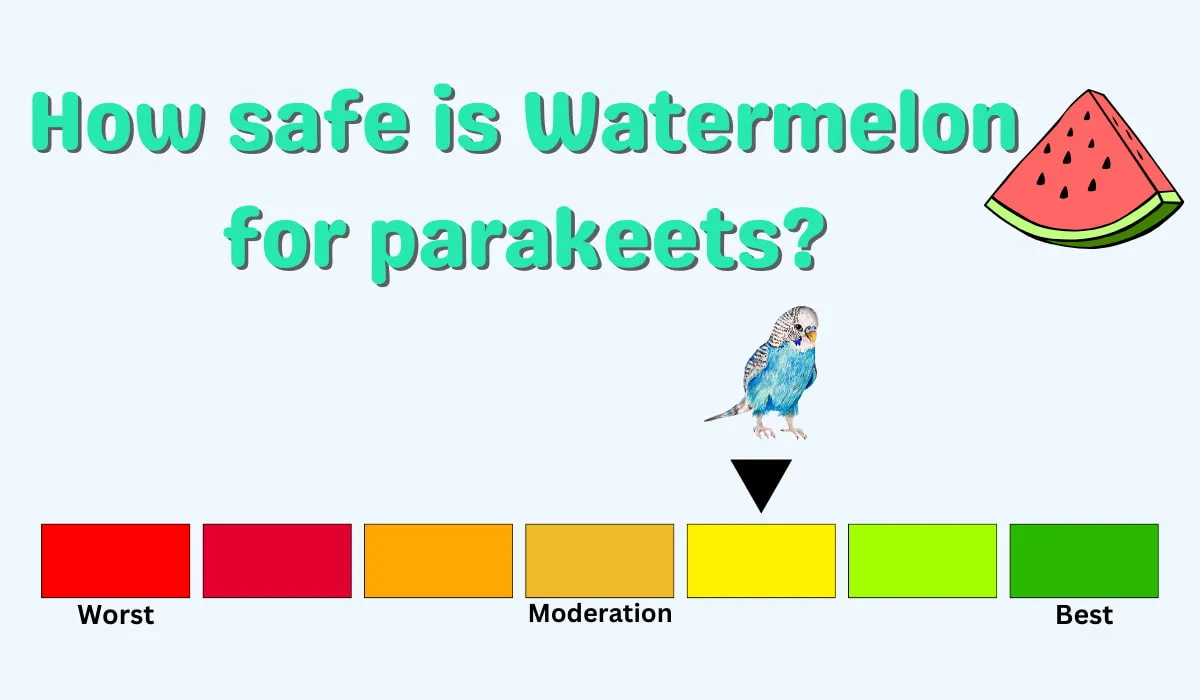Ah, the delight of a crisp watermelon slice on a scorching summer day!
It’s a treat for us humans, but what about our feathered companions, the parakeets?
Can they partake in this sweet respite too? Yes, they can!
Parakeets can enjoy watermelon, but there are a few things to keep in mind.

Can Parakeets Eat Watermelon?
Yes, indeed, parakeets can enjoy watermelon.
This low-sugar fruit, comprising 92% water, is an excellent hydration source, particularly in hot or dry climates. Though safe, it’s wise to serve watermelon in moderation.
Brimming with vitamins A, C, and B6 and minerals like potassium and magnesium, watermelon also boasts anti-inflammatory properties and an abundance of antioxidants.
These can rev up your parakeet’s immune system. So, while a treat, watermelon can make a valuable contribution to your parakeet’s health.
Just remember, everything in excess can turn into a problem.
How much and how often should you feed Watermelon to your Parakeet?
Even though watermelon offers numerous health benefits, it should never replace your parakeet’s primary diet of seeds and pellets.
So, how much watermelon is ideal? Let’s lay down some guidelines:
Watermelon should be about 5% to 10% of your parakeet’s diet.
- Treat your parakeet to watermelon a few times a week twice or three times a week.
- The watermelon piece should be small, roughly the size of a grape or cherry.
The goal here is to prevent overeating and food waste.
How to Feed Watermelon to your Parakeet
Now that we’ve established the ‘how much,’ let’s move on to the ‘how to.’
Here are a few steps to serve watermelon to your parakeet:
- Pick a ripe watermelon. Ensure it’s fresh and not overly ripe or spoilt.
- Wash the watermelon thoroughly to remove any pesticides or dirt.
- Cut the watermelon into small pieces, roughly the size of a grape or cherry.
- Watermelon seeds aren’t toxic to parakeets, unlike those pesky apple seeds, but you might want to remove them to prevent any possible choking incidents.
- Place the watermelon pieces in your parakeet’s food dish.
- Dispose of any uneaten watermelon after a couple of hours to prevent spoilage, and clean the cage thoroughly to keep bacteria and mold at bay
and there you have it! Your parakeet is ready for a delicious and refreshing snack.
A Word of Caution
Watermelon is generally safe for parakeets. However, always observe your bird after introducing any new food. If you notice any behavioral changes or droppings, it’s best to consult your vet.
Can Parakeets Eat Watermelon Seeds
While there’s a common belief that parakeets should avoid watermelon seeds, in reality, they’re not harmful.
These tiny seeds are nutrient powerhouses, providing essential proteins, fats, fiber, iron, magnesium, and zinc.
However, they could potentially be a choking hazard for smaller or juvenile parakeets, so it’s always best to monitor your feathered friend when feeding.
can parakeets eat watermelon rind?
You may be wondering if the watermelon rinds, often discarded by humans, would make a crunchy treat for your parakeet.
Unfortunately, the rind can be challenging for your bird’s digestive system. On top of that, it usually carries a bitter taste that’s not very appealing to our fine-feathered friends.
Another consideration is the potential exposure to pesticides or harmful chemicals, especially if the rind hasn’t been properly washed.
For these reasons, it’s best to stick to the sweet, juicy flesh of the watermelon and leave the rind out of the equation.
is watermelon juice safe for parakeet to drink
You might be tempted to offer your parakeet a sip of refreshing watermelon juice, especially during the hot summer months.
However, this isn’t the best choice for their health due to its high sugar content.
Additionally, watermelon juice can be diluted and could potentially carry contamination.
When it comes to hydrating your pet, stick to the tried-and-true method: fresh, clean water.
Conclusion
Feeding your parakeet watermelon can be a delightful and nutritious treat when done correctly.
Ensure you cut the fruit into small, manageable pieces, discard the rind, and watch your parakeet’s reaction for any potential issues.
Remember, cleanliness is key to ensuring your pet’s health and happiness. So, enjoy sharing this tasty treat with your feathered friend, and happy feeding!
